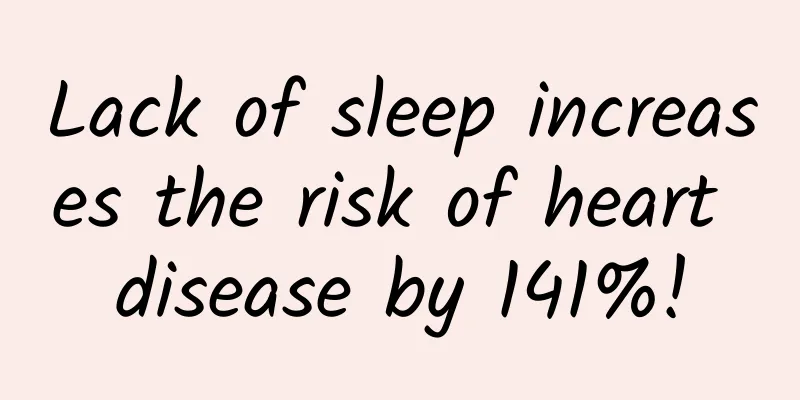Lack of sleep increases the risk of heart disease by 141%!

|
A study recently published in Scientific Reports found that poor sleep quality may damage heart health and increase the risk of heart disease by 141%. The study reviewed sleep data from 6,820 U.S. adults, with an average age of 53, who self-reported their personal sleep characteristics and heart disease history. Of the participants, 633 wore a research device (an actigraph) on their wrist to capture their sleep activity. The researchers looked at multiple aspects of sleep health, such as regularity, satisfaction, alertness while awake, sleep duration, sleep efficiency and sleep duration, and linked them to doctor-diagnosed heart disease. The researchers found that for each additional self-reported sleep health problem, the risk of heart disease increased by 54 percent. Among those who provided sleep data both through self-reporting and research devices, the increased risk of heart disease due to poor sleep health was much higher — a 141 percent increase, a figure considered more accurate. "These findings suggest that understanding a person's 'sleep health problems' is important for assessing heart disease risk. This study is the first to demonstrate that more sleep health problems may increase heart disease risk in middle-aged adults," said Soomi Lee, assistant professor in the USF School of Aging Studies and the study's lead author. "Those who provided both self-reported and monitored sleep data had a higher risk, suggesting that accurate and comprehensive measurement of sleep health is important for preventing heart disease." The research team asked participants about their health, including whether their doctor had confirmed they had heart disease such as arrhythmias, heart murmurs or an enlarged heart. High blood pressure was flagged as a risk factor for heart disease. They also looked at participants' family history of heart disease and sociodemographic factors such as race, sex, smoking history, depression and physical activity. The researchers found that while women reported more sleep health problems, men were more likely to have heart disease, but gender did not affect the overall correlation between the two factors. They also found that black participants had more sleep health problems and higher rates of heart disease than white participants, but the strong link between sleep health and heart disease did not change overall by race. Lee said that while sleep health is important for people of all ages, the team focused on midlife because it is a longer period and has more diverse life experiences and greater stress due to work and family roles. This stage is also when heart disease and age-related sleep problems begin to emerge. Because sleep health can be improved, the findings could help develop preventive strategies to reduce the risk of heart disease, the researchers said. Source: China Science Daily Author: Li Muzi Related paper information: https://www.nature.com/articles/s41598-022-05203-0 The pictures in this article with the "Science Popularization China" watermark are all from the copyright gallery. The pictures are not authorized for reprinting. |
Recommend
Can I get pregnant naturally with premature ovarian failure?
The ovaries are extremely important to women. If ...
What are the benefits of drinking black sesame paste for girls?
When we go shopping in the supermarket, black ses...
Treatment of ductal papilloma
With the improvement of living standards, people ...
Can I have sex with uterine fibroids?
Uterine fibroids are a common disease among moder...
Can you get pregnant without menstruation?
If a female friend does not have her menstruation...
Will body temperature rise due to follicular atrophy?
When the body temperature rises, it is usually be...
Beijing adds 48+2 local cases! Many districts announce lockdown and control areas, a quick picture!
From 0:00 to 24:00 on April 27, Beijing added 48 ...
How to distinguish the quality of sea cucumbers? How to make sea cucumber rice
Sea cucumbers have a tender and smooth taste and ...
Why do I feel nauseous and want to vomit when I'm not pregnant?
In fact, nausea and vomiting symptoms can also oc...
Can skipping rope cause uterine prolapse?
If the physiological surgery recovery period is n...
Normal values for head circumference and biparietal diameter
Every time I had an ultrasound examination, I wou...
What are the differences between missed abortion and ordinary abortion?
Many pregnant mothers will feel happy when they f...









